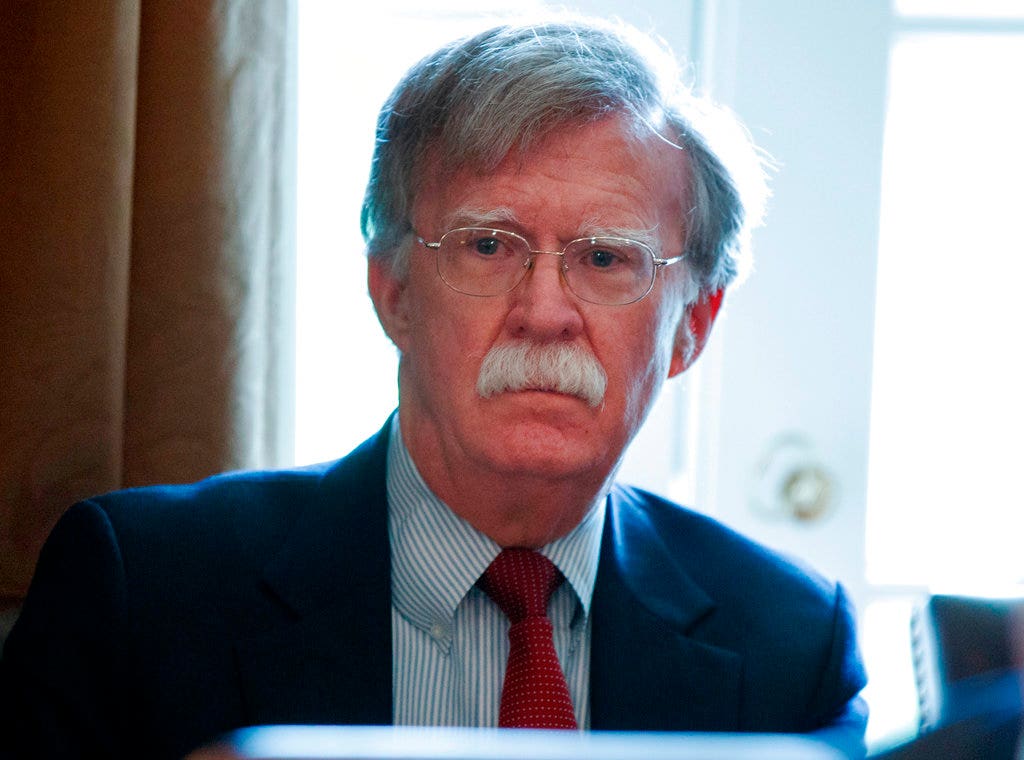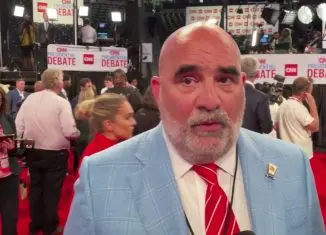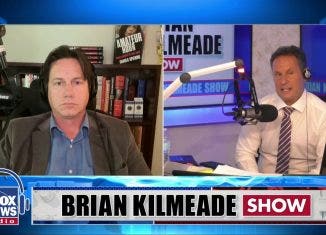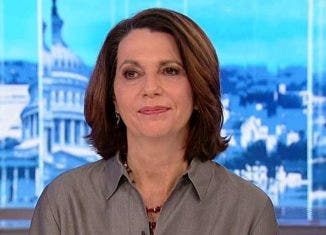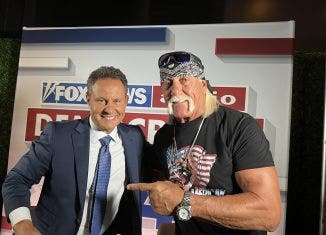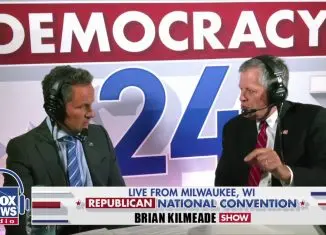President Donald Trump’s National Security Adviser Ambassador John Bolton joined Brian Kilmeade this morning on The Brian Kilmeade Show and commented on his determination to stop the leaks coming out of the White House, being called out by name by North Korea, the President being optimistic and realistic the North Korean summit will still happen and not backing away from the objective of complete and verifiable denuclearization by North Korea.
AMBASSADOR JOHN BOLTON ON THE BRIAN KILMEADE SHOW: ON NORTH KOREA CALLING HIM OUT BY NAME
(Brian Kilmeade) Joining us now is John Bolton. John welcome back.
(John Bolton) Glad to be with you.
(Brian Kilmeade) First time in. First time out in your new position I know you only have 10 minutes but you used to come out with a big brown bag and give me a half hour. I feel a little hurt.
(John Bolton) Well next time I’m in New York half an hour for sure.
(Brian Kilmeade) All right good. Now you can’t get that bag past security so you got to get out of here. We’ll carry that now. So John I was a little shocked not that North Korea’s ever been dependable but out of all these has been pretty smooth for the last four weeks and now all of a sudden out of nowhere the North Koreans have a problem with your statement about Libya. You want the Libya model to be the model we go forward when it comes to getting nukes out of their country. What’s your reaction to them calling you out by name?
(John Bolton) Well you know it’s nothing new. From my perspective back in 2003 when we were going through the six party talks in the Bush administration the North Koreans objected to my characterization of Kim Jong Il Kim Jong un’s father as a dictator and other other things they called me human scum. They called me a bloodsucker. They said I was a very ugly fellow. So I kind of get used to it. It’s what the North Koreans do and it’s the question is whether this really is a sign that they’re not taking our objective of denuclearization seriously. You know Kim Jong un told South Korean president Mungiu a.m. at their April 27 inter Korean summit that he agreed to denuclearization. And so if they’re walking back from it we’ll find out. Think Sara Sanders said this morning pretty much what the President’s thinking is is they’re ready to meet we’re ready to meet if they’re not ready to meet and then they will all meet.
(Brian Kilmeade) You know I ask the fundamental question Why do they want why did they agree to this why do they invite President Trump to do this you are on the outside of that point. If I knew why they invited what brought him to that point for sure there’s theories. But if I knew for sure I would knew why were all of a sudden a delay. My instinct said cold feet they realize the president hasn’t budged and once they start talking without looking bad they have to follow through. My other thought was China. They met with they had this sudden meeting last week in China and I’m wondering what China tried to get across to them and why their behavior changed today are they linked. What do you think?
(John Bolton) Well you know it’s I was just on the phone this morning with my South Korean counterpart the National Security Adviser to their president Mungiu and we went through some of these theories. I think even in South Korea they’re not certain but but all of these are possibilities and it goes to the basic issue has North Korea made a real strategic decision to give up weapons of mass destruction? If they have then we know had to take care that we know how to dismantle their programs we can move the nuclear weapons and other things to Oak Ridge Tennessee. There are a lot of things we can do with our ballistic missiles and I think we can do it relatively quickly with putting enough resources in. If they haven’t made a strategic decision that they’re safer without nuclear weapons. That is President Trump said it could be a pretty short meeting in Singapore. We want to do whatever we can to make the meeting a success. But there should be no mistake that if we don’t see that commitment to denuclearization then we’re not going to make the mistakes of past administrations and fall into endless discussions with North Korea while they ask for more and more benefits. That’s not going to happen.
(Brian Kilmeade) When you talk to Mike Pompeo after he came back after two meetings what did he tell you that you thought you said well that’s new that never happened before. That’s unique. That gives me hope or pessimism.
(John Bolton) Well I think there are signs that point in both directions. I think the fact the North Koreans canceled a meeting was scheduled on Wednesday, Korea time at the demilitarized zone to go over a number of things in our Korean relations but also issues relating to denuclearization. That that’s kind of discouraging. That’s really old thinking. The fact that that the statement that they issued critical of some of the things the United States has been seeking like complete verifiable and irreversible denuclearization was was made yesterday by a by a veteran of the six party talks Kim Kye Gwan who was always a problematic figure in those talks that’s that could be a sign that their thinking has changed but on the other hand preparations for the meeting continue. And the President is determined here to try and test this out. That’s one reason I thought that having a relatively quickly scheduled meeting once the North agreed to it rather than one that drags out for six or nine or 12 months worth of preparation made a lot of sense because I think President Trump will have an opportunity to size up Kim Jong un and get a sense whether he really is committed to denuclearization and better to do it and find out if it’s successful then move ahead.
(Brian Kilmeade) Here’s a quote from John Brennan after word came out that they were delaying to meet with South Korea and had questions about your summit in June says this turn of events is unsurprising since Donald Trump seems enamored with a fire aim ready policymaking process that is fraught with pitfalls as well as potential disasters. Not sure when if ever trump will realize that he is not the smartest man or even the best negotiator in the world indeed far from it. What’s your reaction?
(John Bolton) I mean I just think it’s silly. I think I think this is the voice of the Obama administration. They really did well with North Korea during their eight years in office didn’t they. We saw North Korea make steady progress up to and including their sixth nuclear test which was a thermo nuclear device a hydrogen bomb as it used to be called. We’ve seen during the Obama administration they made extraordinary progress on their ballistic missile technology. And that’s critical to be able to be able to deliver those nuclear devices to targets in the United States. So when Donald Trump came in he inherited the failure of the policy that John Brennan was very much a part of. So certainly it’s a free country and so on but their record is nothing to write home about that. That’s for sure.
(Brian Kilmeade) Well there is strategic patience. Got to say a crisis. The other story is in a might be related that trade talks that China is demanding they’re demanding the world and we’re kind of laughing at it as we try to reconfigure the trade imbalance between the two countries. And the President brought up ZTE. First off your impression of a company that tried to beat the sanctions on North Korea and Iran, were you surprised the president is open to helping that company?
(John Bolton) Well I think I think what the president said is that is that he wants to be sure that the penalty that’s exacted for ZTE behavior is appropriate. It’s a matter that involves trade law enforcement national security literally even as we speak I’ve got an NSC meeting going on at the deputies committee level to try and work this out and we’ll try and present options to the president as soon as we can. So I think this is the particular matters in the normal structure of decision making. And we’ll go from there. The Chinese have one of their most senior officials in Washington for talks beginning today and through through the rest of the week on the larger trade issues and we’ll see how that works out. But I tell you the President feels very strongly about the damage that China has done over many years by pilfering our intellectual property by forced technology transfers by a whole range of unfair trade practices that he’s determined to bring to a halt and I think his entire team of advisers is united on that. They disagree on this issue or that issue but it’s something there’s very broad agreement on and I might say agreement internationally about China’s behavior on trade.
(Brian Kilmeade) Has it been efforts to get Europe on the same page as us so if we decide to pull out or tariff they don’t just go to other our allies or semi allies and just try to make up the products with them?
(John Bolton) Well you know we’ve discussed this with the European leaders the president has a lot of it depends on our bilateral discussions with China because that’s the biggest trade impact really is between the two of us. But everybody’s watching this. The stakes are very high the president is determined to succeed on behalf of American business and American workers.
(Brian Kilmeade) So do you believe these these leaks that are coming out of the administration are national security risk?
(John Bolton) Well I think there are a lot of leaks that are coming out that are national security risks. I’m determined to cut them down. I’ve been trying to take steps with the national security staff. It’s something I work with John Kelly the chief of staff with with a lot of other people. Look the president has to have advisers around him who can have open candid discussions and then not read about him the next day in the newspapers or watch them on television and to the extent that those conversations are being discussed in the public domain. It hurts the ability of the President to be fully informed to make his decision. That’s not something any American whatever your political party should find appropriate or helpful.
(Brian Kilmeade) Do you edit yourself in these meetings because of what’s happening?
(John Bolton) Well I don’t but that’s that’s just me. You know I I’ve I’ve been exposed to a lot of leaks over overtime and it just doesn’t bother me anymore. But I think there are a lot of matters that are highly sensitive that we’ve got to we’ve got to treat very very carefully. A lot of the leaks are more aimed more personally and I think that’s even worse. But what’s important here is to make sure that that we’ve we found the source of the problem and try and correct it.
(Brian Kilmeade) You have found the source of the problem?
(John Bolton) No we’re trying to I think that’s the that’s the objective is to is to try and minimize them as always some amount of this but. But we need to minimize it to the extent possible.
(Brian Kilmeade) You have to run to have a meeting with a very important person about my last question is for me for my listeners and viewers what should we know about your mindset with the June summit. Do you feel as though it’s still going to come off?
(John Bolton) Yeah I think I think that those are the odds. You know we’re trying to be both optimistic and realistic at the same time. I think that’s where the President is. We’re going to do everything we can to come to a successful meeting but we’re not going to back away from the objective of that meeting which is a complete verifiable and irreversible denuclearization of North Korea.
(Brian Kilmeade) We miss having in studio but I’m glad you’re doing what you’re doing. Ambassador John Bolton thanks so much.
(John Bolton) Thanks for having me on. I’ll see in studio soon enough.
(Brian Kilmeade) All right tell the President we said hi.
(John Bolton) I will do it.
(Brian Kilmeade) You got it. Ambassador John Bolton now National Security Adviser

